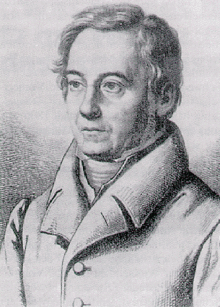Ernst Moritz Arndt
| Ernst Moritz Arndt | |
|---|---|
 |
|
| Born |
December 26, 1769 Rügen, Germany |
| Died | January 29, 1860 (aged 90) Bonn, Germany |
| Nationality | German |
| Occupation | author, poet |
| Notable work | Des Deutschen Vaterland |
| Signature | |
Ernst Moritz Arndt (26 December 1769 – 29 January 1860) was a German nationalist author and poet. Early in his life, he fought for the abolition of serfdom, later against Napoleonic dominance over Germany. Arndt had to flee to Sweden for some time due to his anti-French positions. He is one of the main founders of German nationalism and the 19th century movement for German unification. After the Carlsbad Decrees, the forces of the restoration counted him as a demagogue.
Arndt played an important role for the early national and liberal Burschenschaft movement and for the unification movement, and his song "Was ist des Deutschen Vaterland?" acted as an unofficial German national anthem.
Long after his death, his anti-French propaganda was used again, in both World Wars. This, together with some strongly antisemitic and anti-Polish statements, has led to a highly critical view of Arndt today.
Arndt was born at Gross Schoritz (now a part of Garz on the island of Rügen), then in Swedish Pomerania, as the son of a prosperous farmer and emancipated serf of the lord of the district, Count Putbus. His mother came of well-to-do German yeoman stock. In 1787 the family moved to Stralsund, where Arndt was able to attend the academy. After an interval of private study he went in 1791 to the University of Greifswald as a student of theology and history, and in 1793 moved to Jena, where he came under the influence of the German idealist philosopher Gottlieb Fichte.
After the completion of his university studies he returned home, and for two years was a private tutor in the family of Ludwig Koscgarten (1758–1818), pastor of Wittow on Rügen, and having qualified for the ministry as a candidate of theology, he assisted in church services. At the age of 28 he renounced the ministry, and for 18 months led a life of traveling, visiting Austria, Hungary, Italy, France and Belgium. Turning homewards up the river Rhine, he was moved by the sight of the ruined castles along its banks to intense bitterness against France. The impressions of this journey he later described in Travels in parts of Germany, Hungary, Italy and France in 1798 and 1799.
...
Wikipedia
